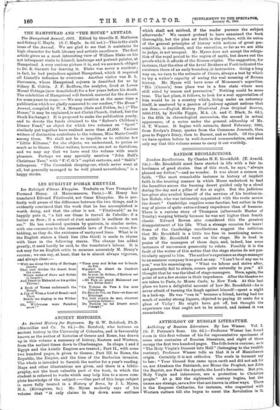RANDOM RECOLLECTIONS.
random Recollections. By Charles H. E. Brookfield. (E. Arnold. 14s.)—Mr. Brookfield must have started in life with a fair .in- heritance of good stories. One of this stock, he says, "always pleased my father,"—and no wonder. It was about a sermon on faith. "The most remarkable instance in history of, implicit faith is the trusting manner in which Moses undertook to lead the Israelites across the burning desert guided only by a cloud during the day and a pillar of fire at night. But the judicious law-giver also availed himself of the services of his brother-in- law Hobab, who was intimately acquainted with the route across the desert." Cambridge supplies some facetiae, but rather in the way of pieces of quite extraordinary impudence than of humour. There is a curious story of Thompson (afterwards Master of Trinity) weeping bitterly because he was not higher than fourth classic. Edward Bowen also considered this the greatest disappointment of his life. What a strange occasion for tears! Some of the Cambridge recollections suggest the criticism that Mr. Brookfield is a little too free in mentioning names. In 1879 Mr. Brookfield went on the stage. He is loud in praise of the managers of those days, and, indeed, has some instances of uncommon generosity to relate. Possibly it is the fault of the writer of this notice that the stage stories do not par- ticularly appeal to him. The author's experience as stage-manager to an amateur company in as good as any. "I can't be of any use to you," was his summing-up. "What we labour and strive after, and generally fail to attain, comes quite naturally to you." All thought that he was the ideal of stage-managers. Here, again, the point of not a few stories is their impudence. After the theatre we are taken to Paris, to Monte Carlo, to New York. At this last place we have a delightful account of how Mr. Brookfield—he is never afraid of turning the laugh against himself—spent a night in a lock-up. He was "run in" because a friend, having had too much of sundry strong liquors, objected to paying 10 cents for a glass of Vichy He might have got off, but thought the experience one that ought not to be missed, and indeed it was remarkable.






















































 Previous page
Previous page